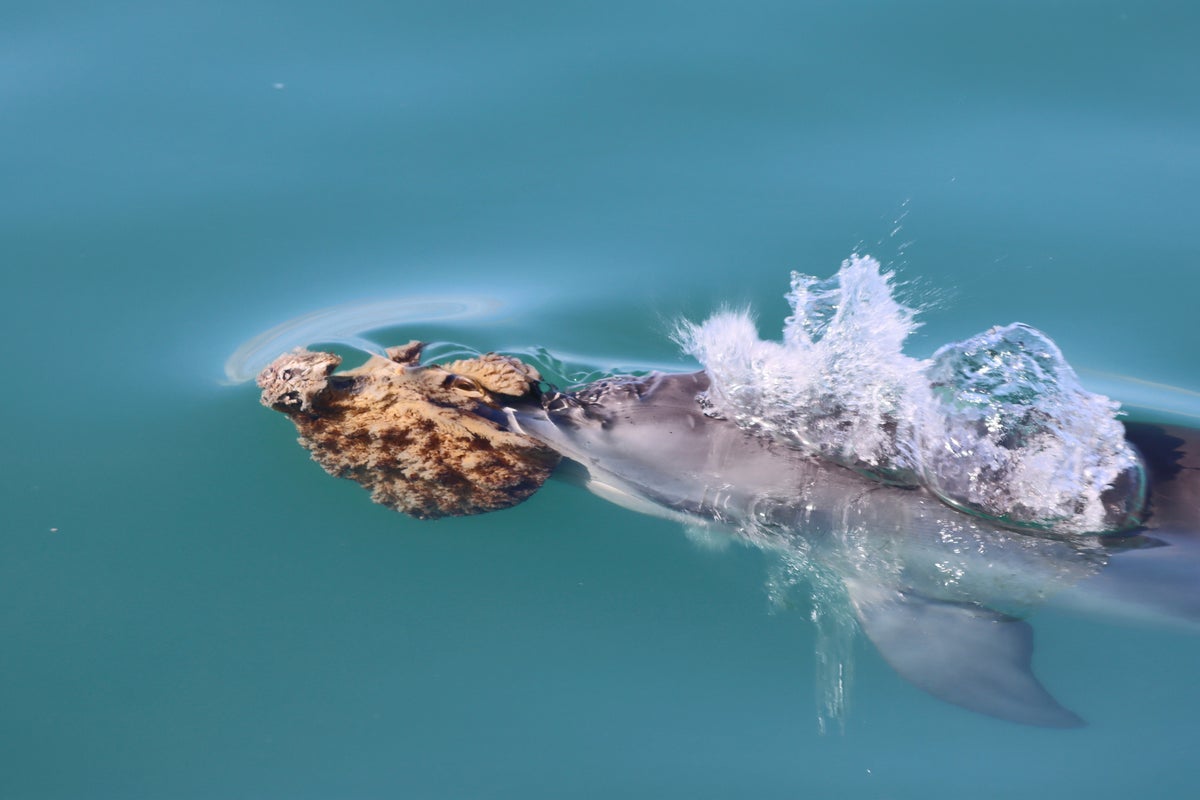Science
Dolphins Innovate Sponge Hunting Technique to Catch Fish

Bottlenose dolphins in Shark Bay, Australia, have demonstrated a remarkable hunting strategy that involves using marine sponges to help them catch fish. By placing a sponge on their beak, resembling a clown nose, these dolphins can navigate rocky seabed channels without injuring themselves. This clever technique stirs up fish such as barred sandperch, making them easier to catch.
Recent research published in the journal Royal Society Open Science highlights the complexities of this behavior. While the sponge serves as a protective tool, it also interferes with the dolphins’ advanced echolocation abilities, which they rely on for navigation and hunting. Co-author Ellen Rose Jacobs, a marine biologist at the University of Aarhus in Denmark, explained, “It has a muffling effect in the way that a mask might. Everything looks a little bit weird, but you can still learn how to compensate.”
Jacobs utilized underwater microphones to analyze how dolphins in Shark Bay continued to use echolocation clicks while hunting with sponges. Her studies revealed that despite the distortion caused by the sponges, these dolphins effectively adapted their hunting strategy. The research shows that, for those dolphins skilled in sponge hunting, this method is highly efficient.
The sponges used by these dolphins vary significantly in size, ranging from that of a softball to a cantaloupe. Mauricio Cantor, a marine biologist at Oregon State University who was not involved in the study, likened the challenge of sponge hunting to “hunting when you’re blindfolded — you’ve got to be very good, very well-trained to pull it off.”
This specialized hunting technique is rare; the study noted that only about 5% of the dolphin population in Shark Bay engages in it, which amounts to around 30 dolphins, according to Jacobs. The learning curve for this skill is steep, with dolphins requiring many years to master it. Boris Worm, a marine ecologist at Dalhousie University in Canada, emphasized that not all dolphins choose to pursue this complex skill.
Dolphin calves typically stay with their mothers for three to four years, during which they learn essential survival skills. The delicate art of sponge hunting is transmitted exclusively from mother to offspring, as noted by co-author and marine biologist Janet Mann from Georgetown University. This unique cultural behavior highlights the importance of social learning among dolphins and the significant role maternal guidance plays in their development.
The findings of this research not only shed light on the innovative behaviors of dolphins but also underscore the intricate relationships within marine ecosystems. As more studies emerge, they enhance understanding of the adaptability and intelligence of these remarkable creatures.
-

 Entertainment3 months ago
Entertainment3 months agoAnn Ming Reflects on ITV’s ‘I Fought the Law’ Drama
-

 Entertainment4 months ago
Entertainment4 months agoKate Garraway Sells £2 Million Home Amid Financial Struggles
-

 Health3 months ago
Health3 months agoKatie Price Faces New Health Concerns After Cancer Symptoms Resurface
-

 Entertainment3 months ago
Entertainment3 months agoCoronation Street’s Carl Webster Faces Trouble with New Affairs
-

 Entertainment3 months ago
Entertainment3 months agoWhere is Tinder Swindler Simon Leviev? Latest Updates Revealed
-

 Entertainment4 months ago
Entertainment4 months agoMarkiplier Addresses AI Controversy During Livestream Response
-

 Science1 month ago
Science1 month agoBrian Cox Addresses Claims of Alien Probe in 3I/ATLAS Discovery
-

 Entertainment4 months ago
Entertainment4 months agoKim Cattrall Posts Cryptic Message After HBO’s Sequel Cancellation
-

 Entertainment2 months ago
Entertainment2 months agoOlivia Attwood Opens Up About Fallout with Former Best Friend
-

 Entertainment3 months ago
Entertainment3 months agoMasterChef Faces Turmoil as Tom Kerridge Withdraws from Hosting Role
-

 Entertainment4 months ago
Entertainment4 months agoSpeculation Surrounds Home and Away as Cast Departures Mount
-

 World2 months ago
World2 months agoCole Palmer’s Mysterious Message to Kobbie Mainoo Sparks Speculation





















